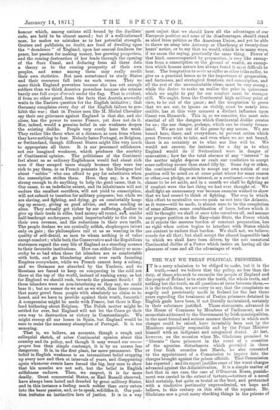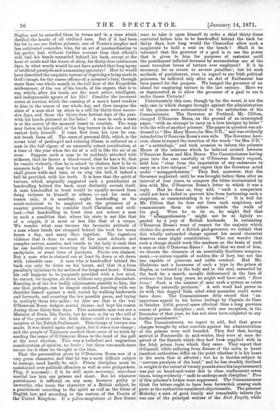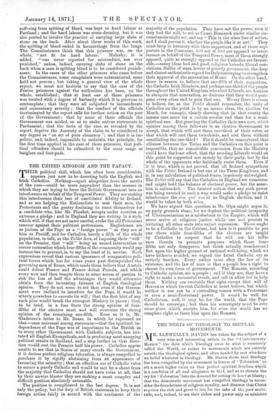THE WAY WE TREAT POLITICAL PRISONERS.
IT is a sorry admission to be obliged to make, but it is the truth,—and we believe that the policy, no less than the duty, of those who seek to reconcile the people of England and the people of rreland is to state the truth, the whole truth, and nothing but the truth, on all questions at issue between them,— it is the truth then, we are sorry to say, that the complaints so angrily and persistently made in Ireland for the last three years regarding the treatment of Fenian prisoners detained in English gaols have been, if not literally maintained, certainly in their substance justified. Those statements, advanced in the House of Commons by Members of Parliament, and in memorials addressed to the Government by Irish municipalities, in the most formal and serious manner therefore in which such charges could be raised, have invariably been met by the Ministers especially responsible and by the Prime Minister himself with an indignant and categorical denial. At last, however, on the occasion when Mr. Gladstone promised to " liberate " these prisoners in the event of a cessation of the agrarian disturbances which prevailed in three or four Irish counties last March, he also consented to the appointment of a Commission to inquire into the charges brought against the prison officials. That Commission has reported ; and its report justifies some of the worst charges advanced against the Administration. It is a simple matter of fact that in one case, the case of O'Donovan Rossa, punish- ment was carried to the extent of torture,—torture of a novel kind certainly, but quite as brutal as the boot, and protracted with a vindictive pertinacity unprecedented, we hope and believe, in this century on this side of the equator. Mr. Gladstone saw a great many shocking things in the prisons of
member of the British Parliament. This charge of torture was The Commissioners, we regret to add, find that grave made. It was denied again and again, but it was a true charge ; charges brought by other convicts against the administration and the people of Tipperary marked their sense of its truth by of the prisons were well founded. They find that, having sending the name of O'Donovan Rossa to the head of the poll arrived at Pentonville in mid-winter, they were at once de- at the next election. This was a turbulent and ungracious in/yea of the flannels which they had bee' supplied with in manifestation of opinion, no doubt ; but there was much more the Irish prison from which they came. They report that excuse for it than we thought at the time. O'Connell, while suffering from disease of the aorta, or heart
That the provocation given by O'Donovan Bosse was of a (medical authorities differ on the point whether it is his heart very gross character, and that he was a most difficult subject or his aorta that is affected ; but he is besides subject to to manage, need hardly be said. Prison discipline must be ,"nervous paralysis of the head," and he has steadily declined maintained over political offenders as well as over pickpockets. in weight to the extent of twenty pounds since his imprisonment) Flog, if necessary ; if it be still more necessary, introduce was put on bread-and-water diet in close confinement seven martial law into our prisons and shoot. But let whatever times, being evidently " unfit to undergo such discipline." Five punishment is inflicted on any man, however guilty or of this prisoner's letters were suppressed. The Commissioners unworthy, who bears the character of a British subject, be think the letters ought to have been forwarded, erasing such a punishment according to the spirit as well as the letter of parts as the authorities considered objectionable. The prisoner English law, and according to the custom of the Courts of Mulcahy, a man of good family and remarkable talents (he the United Kingdom. If a police-magistrate at Bow Street was one of the principal writers of the Irish People), while
Naples, and he recorded them in terms and in a tone which were to take it upon himself to order a thief thirty times thrilled the hearts of all civilized men. But if it had been convicted before him to be handcuffed behind the back for his lot to see one Italian prisoner, one of Poerio's rougher and thirty days, how long would the Chancellor allow such a less cultivated comrades, who, for an act of insubordination to magistrate to hold a seat on the bench Shall it be his gaoler, had, without further warrant than that official's tolerated that the governor of a gaol is to use the power will, had his hands manacled behind his back, except at the that is given to him for purposes of restraint until hour of meals and the hours of sleep, for thirty-four continuous the punishment inflicted becomes by accumulation one of the days, in what words would he not have painted that long agony most truculent forms of torture ever employed ? If it be of artificial paralysis and unmanning ignominy ! How he would necessary, let us return to severer penalties ; but let such have described the exquisite torture of depriving a being made in methods of punishment, even in regard to our Irish political God's image, for the coarse offence of a moment's fury, through prisoners, be inflicted only after an Act of Parliament has more than one whole month in the full heat of the Neapolitan been passed for the purpose. We hanged the governor of an midsummer, of the use of his hands, of the organs, that is to island for employing torture in the last century. Have we say, which, after his brain, are the most active, intelligent, so degenerated as to allow the governor of a gaol to use it and indispensable agents of his life! Consider the incessant under Queen Victoria ?
series of services which the cunning of a man's hand renders Unfortunately this case, though by far the worst, is not the to him in the course of one whole day, and then imagine the only case in which charges brought against the administration state of a man shut up alone in a cell for thirty-four succes- of the prisons were substantiated to the satisfaction of the sive days, and those the thirty-four hottest days of the year, Commissioners. The Governor at Portland, Mr. Clifton, with his hands pinioned at the loins ! A man in such a state charged O'Donovan Rossa, on the ground of an intercepted is at the mercy of the meanest insect in creation. The wasp paper, "with an attempt to carry on a love intrigue by letter " may fasten on his eyelid, or the bug burrow in his ear, and he with the wife of another prisoner. The paper in question was ad- cannot help himself. If tears flow from his eyes he can- dressed to " Mrs. Mary Moore, for Mrs. O'D.," and was evidently not brush them off. The sense of personal filth, which is the intended for O'Donovan Rossa's own wife. The Governor, how- sorest trial of prolonged and relaxing illness, is enforced on a ever, chose to regard the insertion of the words "for Mrs. O'D." man in the full vigour of an unusually robust constitution, at as "a subterfuge," and took occasion to inform the prisoner a time of the year when the air of a cell is like the air of an Moore of the relations which he believed existed between oven. Suppose such a man to be suddenly attacked with O'Donovan Roma and Mrs. Moore. The Commissioners having sickness, that he bursts a blood-vessel, that he has a fit, that gone into the case carefully at O'Donovan Rossa's request, he vomits violently, that he is seized by cholera, how is he to hold him " clear from the imputation of any endeavour to summon help He may be too weak to cry so that his voice carry on a love intrigue," and regret that the Governor acted shall pierce walls and bars, or to ring the bell, if indeed a under " misapprehension." They find, moreover, that the bell be provided, with his teeth. It is here that the spirit of Governor neglected, until he was brought before them after an torture, which originally suggested such a punishment as interval of four years, to compare the letter incriminated by handcuffing behind the back, most distinctly reveals itself. him with Mrs. O'Donovan Rossa's letter to which it was a A man handcuffed in front would be equally secured from reply. Had he done so, they add, " such a comparison doing violence to himself or others, — and for such a could not have failed to prevent him from harbouring such a reason only, it is manifest, ought handcuffing or the suspicion, or communicating it to others." It is well for strait-waistcoat to be employed on the prisoners of a Mr. Clifton that he does not form such suspicions, and country pretending to consider itself Christian and civil- communicate them to others outside the walls of ized,—but handcuffing in front does not reduce a man his gaol. Were he to do so, he might find that to such a condition that, where his state is not like that his " Misapprehension " might not be so lightly re- of a cripple, it is more or less like that of a corpse. garded by a jury of British husbands. In estimating We wonder what may become the favourite attitude of O'Donovan Rossa's want of respect for the majesty which a man whose hands are strapped behind his back for many clothes the person of a British gaol-governor, we submit that hours a day, and many days together. The ingenious this wholly unfounded charge against his moral character violence that is done to some of the most delicate and deserves some slight consideration. Who can wonder that complex nerves, muscles, and vessels in the body is such that such a charge should work like madness on the brain of such he can hardly escape incurring the liability to aneurism, or a man as this O'Donovan Rossa ? In all that we read of him, anchylosis, or some form of paralysis. Poerio was chained, we discern the elements of an essentially Southern tempera- But a man who is chained can at least lie down or sit down ment,—a nature capable of sudden fits of fury, but not the with tolerable ease. A man who is handcuffed behind the less capable of generous and noble conduct. Had Mr. back can only lie down on his breast, and that in a form Gladstone met 'a lazzarone of such a type in the prison at peculiarly injurious to the action of the lungs and heart. Unless Naples, so tortured in the body and in the soul, manacled by his cell happens to be purposely provided with a low stool, the back for a month, morally dishonoured in the face of he cannot, we imagine, sit down without very great discomfort. evidence for four long years, he might well have said, "Ecce Kneeling is of the few bodily adjustments possible to him, the homo ! Such is the manner of man such a system as exists one that, perhaps, can be longest endured, kneeling with one in Naples naturally produces." A soft word had power to shoulder leaned against a wall, varied by walking backwards do with this dogged Irish rebel what manacles could never and forwards, and counting the few possible paces, and trying have done. The Commissioners drily record that "an to multiply them into miles ; we dare say that is the way opportune appeal to his better feelings by Captain chi Cane O'Donovan Rossa dodged mortal disease, and kept his reason in October, 1868, proved more effectual than a long previous during those thirty-four days. This miserable man was not a course of prison discipline ; and, with one exception, in the Minister of State, like Poerio, but he was, so far as the will of December of that year, he has not since been subjected to any one of the greatest of the Irish shires could so make him, a further punishment."
suffering from spitting of blood, was kept to hard labour at Portland ; and the hard labour was stone-dressing, but it vi as also proved to involve the practice of carrying large slabs of stone on the back. After about three weeks of this work, the spitting of blood ended in haemorrhage from the lungs. The Commissioners think that this prisoner was, on the whole, " not fit for hard labour." Mulcahy, it is added, "was never reported for misconduct, nor ever punished," unless, indeed, carrying slabs of stone on the back when a man is spitting blood is to be considered punish- ment. In the cases of the other prisoners who came before the Commissioners, some complaints were substantiated, some held not proven ; but taking a general view of the whole report, we must not hesitate to say that the case of the Fenian prisoners against the authorities has been, on the whole, established ; that at least one of those prisoners was treated with a degree of barbarity which it is grievous to contemplate ; that they were all subjected to inconsiderate and unnecessary severity ; that the conduct of the officials incriminated by the report calls for further action on the part of the Government ; that by some of these officials the Government was misled, so as to make untrue statements in Parliament ; that the facts of the case, as revealed by the report, deprive the Amnesty of the claim to be considered in any degree as " an act of pure clemency "; and that it is im- politic, and, indeed, impossible to maintain the principle, for the first time applied in the case of these prisoners, that poli- tical offenders should be submitted to the same usage as burglars and foot-pads.




































 Previous page
Previous page